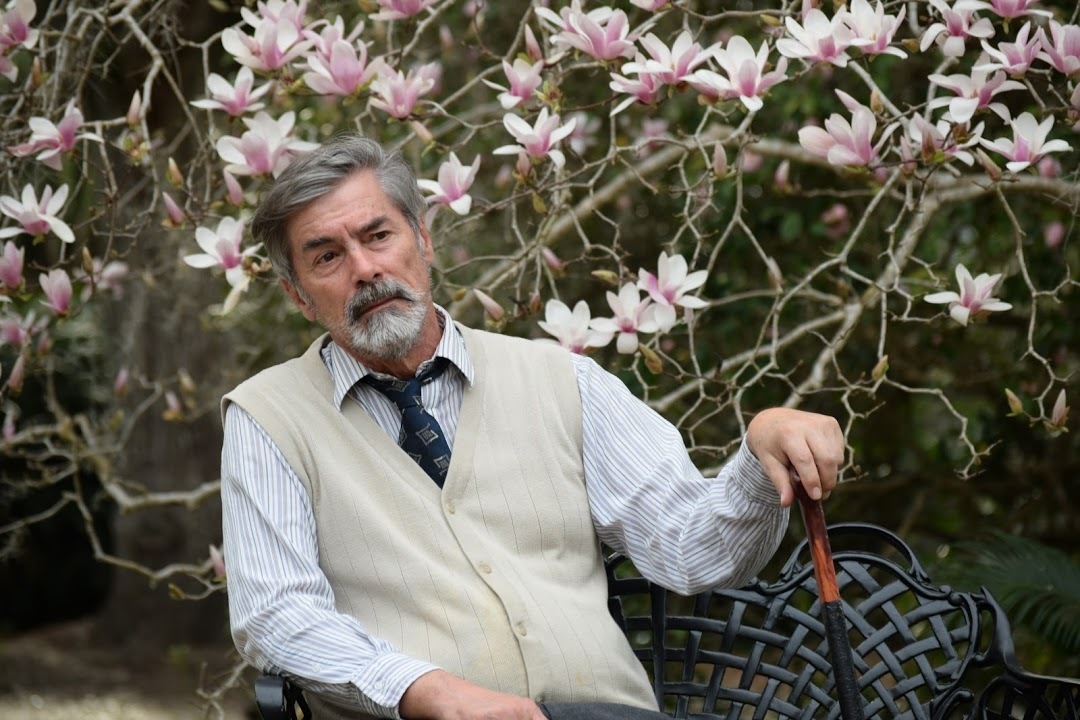Review: BLIND DATE at Tallahassee Hispanic Theater

Seeing the World Differently From a Park Bench: Blind Date
My mother-in-law knew every time I rolled my eyes, even though she was blind and couldn't see my face, I am sure.
"Blind Man" (Lanny Thomas) in the Tallahassee Hispanic Theater Production of "Blind Date" knows truths that transcend the visible, even though he is blind.
The brief description of the play I had read before attending led me to believe that it centered around "Blind Man" and the ongoing series of confessions he seemed to elicit from people.
That description only covered part of this insightful, suspenseful show.
Blind Date was staged at the Goodwood Carriage House (the production will move to the Florida State University Fine Arts Annex for the March 23 and 24 performances). The set alternated between a Buenos Aires park bench and a home interior that also served as a psychologist's office. The simple park bench, the plants and the chirping birds of the set were an unobtrusive backdrop for the conversations between "Blind Man" and his visitors.
When "Man" (Victor Duncan) begins speaking to "Blind Man," it seems to be the beginning of a brief, forgettable encounter. By the end of the play, it becomes apparent the interaction was hardly forgettable. At first, I could relate to "Man's" predicament: he was avoiding a meeting at work, overwhelmed by his professional responsibilities, wanting a few minutes of fresh air. "Blind Man" peeled "Man's" façade away layer by layer, eventually revealing a complex and troubling scenario.
Lanny Thomas centers this show with a calm demeanor that belies "Blind Man's" insights. His self-deprecating humor kept the tenor of the dialogue from slipping into one-note seriousness.
After "Man" moves on, "Blind Man" has another visitor to the park bench: "Young Woman" (Robin Jackson). As "Blind Man" and "Young Woman" converse, we learn that "Man" isn't the only bench visitor with surprising layers obscuring a complex core of motives and emotions. Jackson had an effervescent way about her, especially the way she said "sagacity."
Following intermission, the set is transformed into a psychologist's home office. "Psychologist" (Louise Ritchie) is providing a session to "Woman" (Marcy Palmer). Ritchie's psychologist was longer on analysis than empathy as she tried to help Palmer's character discover the root cause of her unhappiness. Palmer's "Woman" is palpably unhappy and seems resigned to life outcomes she feels powerless to change.
After "Woman's" session ends, "Psychologist's" husband arrives home. We learn "Psychologist" is married to "Man." It turns out that "Man's" tardiness to the meeting with the bank president is hardly his only problem; the marriage has significant issues too. A blistering fight between a mental health professional who had just calmly led a patient through a methodical analysis of her love issues and her own spouse reverses the calm in the room as fury flashes quickly.
When the play returns to the park bench, Palmer's "Woman" is "Blind Man's" companion. As the show ends, we are reminded that "seeing" can be defined in different ways and time can be measured creatively.
Having had extensive experience with a blind family member, I see portrayals of blind people through a non-objective filter. Without explaining which characters this comment applies to, here's an observation. One character grabs Blind Man's hand without asking permission first (this can be disorienting to blind people) and another asks permission first. This small difference seemed to me a metaphor for the show in other ways. Some people in life grab what they want without concern for how it will feel to the other party. Others don't go for what they want at all or, at a minimum, ask permission before proceeding.
I wish I had known more about Jorge Luis Borges, the Argentinian writer on whom "Blind Man" is inspired, prior to seeing the show. Read a Poetry Foundation profile if you would like more background on Borges. Even knowing that "circular time and the idea that all people are but one person" are two of his recurring themes explains dynamics of playwright Mario Diament's construction.
I also wished I had known more about Flaubert's "Sentimental Education," which is referred to throughout the play. Now that I have read a Goodreads summary, those references make more sense.
These five characters are interrelated in ways it's impossible to share in a review without giving away major plot points. In the process of getting what they want, and grieving what they have lost, we are reminded that every choice has ripple effects and it's always cathartic to have a listening ear.
Blind Date, directed by Judi Persons, will be staged March 23 and 24 at 8:00 p.m. at the Florida State University Fine Arts Annex. The ticket price is $5, and students will be admitted free.
Photo credit: Tallahassee Hispanic Theater
Reader Reviews

Videos

